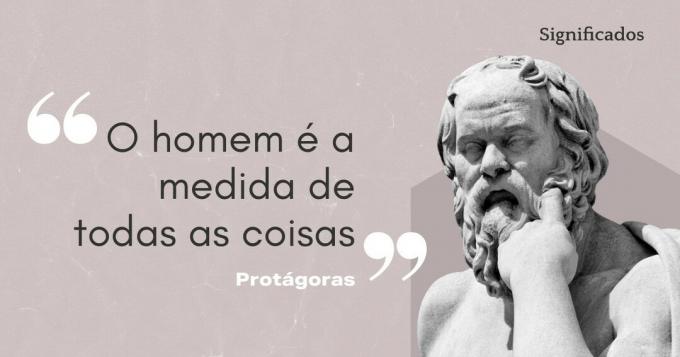Below we present a summary of philosophical phrases (also called maxims or aphorisms) of fourteen great Western thinkers from different eras, from Classical Antiquity to Contemporaneity.
Following each sentence, we also add a brief explanation of their meanings.
1. Heraclitus of Ephesus (540 – 470 BC) W.)

Heraclitus, a prominent pre-Socratic philosopher, argued that reality was in permanent transformation. Nothing would be constant, because everything is fleeting, everything flows (panta rhei), changes.
The Heraclitean principle of transience influenced many thinkers and artists throughout history. Below is the full text of his famous aphorism:
No one can step into the same river twice, because when you step into it again, you don't find the same waters, and the very being has already changed. Thus, everything is governed by the dialectic, the tension and the alternation of opposites. Therefore, the real is always the result of change, that is, of the struggle between opposites.
Heraclitus
2. Protagoras of Abdera (490 – 415 BC) W.)
Protagoras was an ancient Greek sophist philosopher who gained notoriety with this emblematic phrase.
The maxim expresses the relativism characteristic of the sophists: for them, there would not be an absolute truth, but different subjective and particular perceptions of truth. That is, what is true for one person is not necessarily true for another.
This idea is even more evident when we observe the sentence in its entirety: "Man is the measure of all things, of things that are, while they are, of things that are not, while they are not."
Sophist relativism was criticized by Socrates and his disciples, who considered it a rhetorical device that these thinkers used for their own benefit.
The Socratics defended the existence of absolute truth and universal values.
3. Socrates (470 – 399 a. W.)

The famous phrase of the philosopher Socrates, also known as socratic paradox, shows the limitation of the condition, unable to understand the totality of knowledge.
For the great Greek thinker, human wisdom would reside in the awareness of your own limitations, of ignorance itself.
4. Plato (427 – 347 BC. W.)

In this sentence, the philosopher Plato reflects on the difference between humans and other animals, especially on the young people of these groups.
This reflection shows the insubordinate, rebellious and questioning nature of human youth, which has always been averse to authority and, therefore, to "domestication".
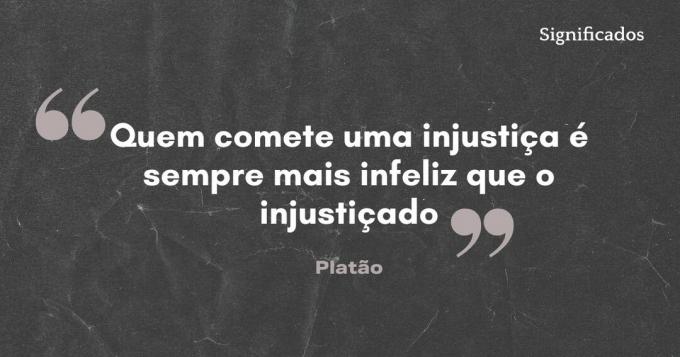
In this other sentence, the disciple of Socrates affirms that, despite the unhappiness of suffering an injustice, being wronged is better than doing an injustice.
In other words, the one who commits an injustice, in addition to suffering the consequences of his act, will have to carry with him the conscience of the evil committed.
5. Aristotle (384 – 322 a. W.)
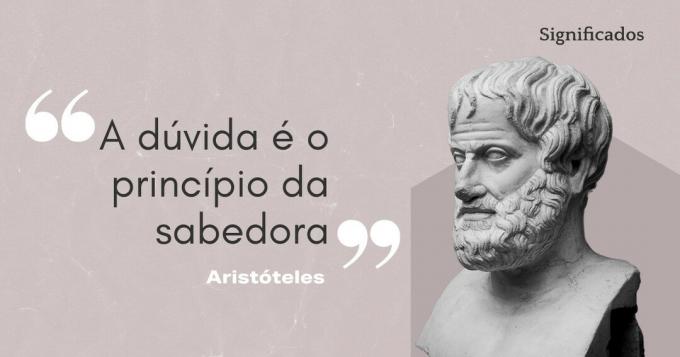
Aristotle highlights, in this aphorism, what he considers fundamental to attain wisdom: doubt.
Axiomatic, indisputable certainty, then, would be opposed to wisdom. It is necessary to question, inquire, contradict established ideas to obtain wisdom.
6. Saint Augustine (354 – 430)
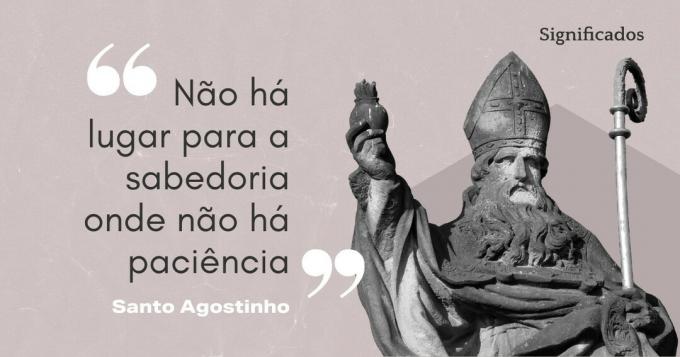
"There is no place for wisdom where there is no patience". For Saint Augustine, philosopher responsible for laying the foundations of Catholicism in the Middle Ages, it is necessary to know how to wait to reach knowledge.
Learning, as we know, is never instantaneous, immediate. It is a slow process that takes time and patience. Therefore, without patience, one cannot learn; and without knowledge, there is no wisdom.
7. René Descartes (1596 – 1650)
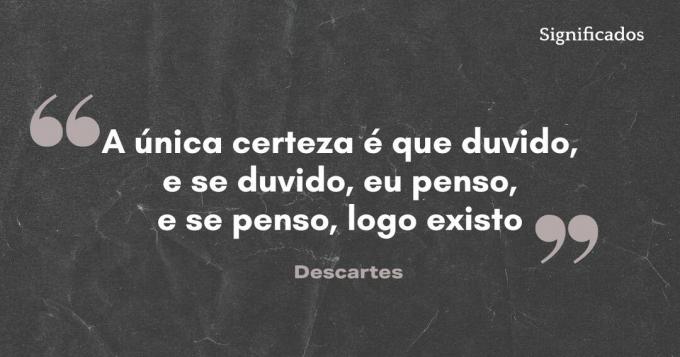
"I think therefore I am" (I think, ergo sum) is a famous quote by the French philosopher René Descartes. For him, doubt indicates the existence of thought, and the existence of thought, in turn, reveals the existence of the human being.
For the French thinker, when doubting everything, it is necessary not to be deceived by the limitations of the senses. To solve this problem, he created a method of understanding reality, known as cartesian method, which served as the basis for further scientific development.
8. Jean-Jacques Rousseau (1712 – 1778)

The maxim presents a synthesis of the thought of Jean-Jacques Rousseau, who considered the process of socialization harmful to humanity.
For the French philosopher, before the advent of society, "primitive" man (le bon sauvage) lived happily, taking sustenance from nature and living with it in balance, meeting with his fellow men only in cases of need.
With society, the concept of private property emerged, and men began to subjugate their peers, changing the balance of their relationship with nature and, consequently, "depraving" humanity.
The concept of the "noble savage", the idealization of nature and the critique of society proposed by Rousseau profoundly influenced Romanticism, the artistic movement of the early 19th century.
9. Immanuel Kant (1724 – 1804)

Immanuel Kant argued that morality should be based on pure reason, that is, it should not be conditioned to human subjectivity.
For the German philosopher, there would be a universal, categorical ethical parameter, based on reason. Morality, therefore, should not be particular, based on "guesses".
In this sense, human acts should be governed by the duty rational rather than the subjective need for reward.
10. Arthur Schopenhauer (1788 – 1860)

Schopenhauer, in several of his texts, praises solitude. According to the German philosopher, it would be a prerequisite to become an extraordinary person, an "exceptional spirit".
Being alone, communicating with oneself, would then be a kind of self-improvement and, simultaneously, an exercise in self-awareness. In another aphorism, Schopenhauer states:
Only when you are alone are you free [...] Each one will flee, endure or love loneliness in exact proportion to the value of their personality. For, in solitude, the petty individual feels all his pettiness, the great spirit, all his greatness; in a word: each one feels what he is.
Schopenhauer
11. Karl Marx (1818 – 1883)

Karl Marx's thought was materialistic, therefore, denied the existence of everything that is not concrete, material. In short, he did not believe in God and despised religions.
For the German philosopher, the function of religion would be to ease the suffering of workers and conform them to their exploited condition, with fanciful promises of reward in the afterlife.
Religion, therefore, would be an instrument of alienation of the underprivileged, favoring the owners of the means of production in class struggle.
12. Friedrich Nietzsche (1844 – 1900)

In this maxim, Nietzsche resorts to the metaphor of the "abyss" to refer to the Self perception, that is, what we perceive of ourselves. A behavior, paraphrasing the famous philosopher, "human, all too human".
By "abyss" we can understand our "inner demons": anxieties, frustrations, fears, weaknesses, etc.
When we dwell on these "demons", when we "look into the abyss for a long time", it is it is common to bond with them, in an unhealthy process of identification with our ills subjective. It is when the "abyss looks into you".
13. Jean-Paul Sartre (1905 – 1980)
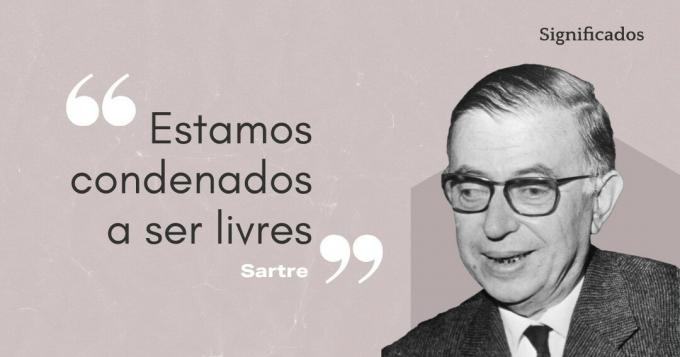
Alongside Kierkegaard and Camus, Sartre was one of the exponents of the philosophical current known as existentialism.
For this current, the existence of men precedes their essence. In this sense, our lives would be the result of our choices. These choices require freedom.
We would therefore be "condemned to be free". The French philosopher defended the total freedom so we can decide what to do with our lives.
14. Michel Foucault (1926 – 1984)

This thought by the philosopher Michel Foucault dialogues with Nietzsche's aphorism seen earlier. Both deal with our "secret monsters", but the French thinker goes further by suggesting a way of dealing with our "hidden insanity". Watch the excerpt in full:
We need to resolve our secret monsters, our hidden wounds, our hidden insanity. We can never forget that dreams, motivation, the desire to be free help us to overcome these monsters, defeat them and use them as servants of our intelligence. Don't be afraid of pain, be afraid not to face it, criticize it, use it.
Foucault
As we can see, Foucault proposes that we fearlessly face our "monsters". We must, then, overcome them and, with intelligence, use them in our favor.
Bibliography:
- WARBURTON, Nigel. A brief history of philosophy. São Paulo: LPM, 2019.
- VALENTE, Decio. Philosophical selection of thoughts and reflections. Lisbon: Cultural Diffusion, 1987.
See too:
- Philosophy
- What is Epistemology
- What is Nihilism
- what is hedonism
- Epicureanism
- ethic
- what is moral

